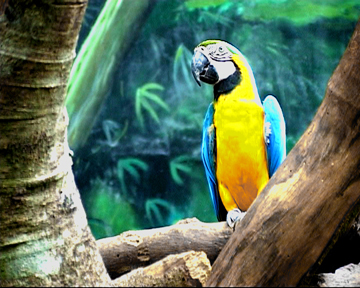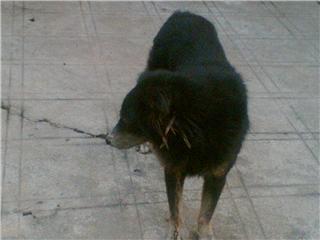Burning Issues
-Russell Crisante' Fernandes
On the 19th of May, we woke up to a terrible piece of news. Unsubstantiated news coming in from friends in Bandhavgarh mentioned that a Tiger had been either badly injured or killed. As with all initial reports, the news filtered in slowly and was laced with
different levels of speculation. When the dust settled, the worst fears were confirmed. The Jhurjhura Tigress, the mother of three cubs no more than 6 months old, was dead after a collision with a vehicle. At the time of writing this, there is still no confirmation
about who the guilty party was and the needle of suspicion points towards either a private vehicle being driven by the son of a minister in the state cabinet or a forest department vehicle. Either way, it would be ironical that this tragedy occurred at the
hands of people that should know better than to break rules set in place for all.
While the initial reactions have ranged from anger to grief, the time is now upon us to review what lessons can be taken away from this tragedy. The fact remains that India's population of Tigers in the wild has reduced by 4, as the cubs are now facing a life
in captivity without their guardian, teacher and loving mother. There may be a lot of opinions on what should have and what needs to be done, but looking ahead it is important to debate quickly and implement changes rapidly before any more generations are
lost.
Lessons for the Tourists and Operators
Plain and simple, the tourists visiting the reserves have an obligation and a responsibility to behave better. It has been stated numerous times over that we are visitors to the park and have to obey the rules of the place, yet most do not get out of the weekend
multiplex mode. There is good reason why 3D glasses are not supplied during a visit, as what you experience here is real and fragile. No photograph or sighting is worth breaking the rules for, and especially not when this behavior puts lives at risk. The burden
of good behavior is now upon Tourists as further incidents like these will jeopardize the very privilege to enter the areas that we have shown scant respect for.
On similar lines, Tour Operators and their ilk need to realize that they have to play a greater mediating role here. A practice that should have been followed a long time back, is a session with the chief naturalist to explain clearly the rules and regulations
of the park. More importantly, the consequences of breaking these rules need to outlined clearly. If some tourists are made aware that their operators will play no part in bailing them out for their misdemeanors, it could have a significant impact on their
restraint. The same practice needs to be enforced very strictly with their drivers, guides and other staff. If not, the operators need to just look at the current revenue models of their counterparts in Sariska to understand what is really responsible for
bringing in the money. Rather than waiting for either the flagship species to disappear or for the rules to change drastically, the time has arrived to evolve and practice the often preached rhetoric of responsible tourism.
Lessons for Conservationists and NGOs
While there is no denying the good work that many NGOs are currently doing in the field of conservation, it is clear that some only survive on bad news. Without tragic news from the jungle, there is no justification in asking for donations or to project the
Forest Department as incapable of handling anything. There is a difference in whistle blowing and blowing your own trumpet and it's a matter of time before people stop taking you seriously if you provide nothing but negativity. The situation is bleak, but
if experts tell the common people that there is no hope they will have no reason to believe otherwise rather than working towards change.
Something to look back on is another contentious Tiger tragedy recently at Ranthambhore. While 2 sub adult Tigers were killed after being poisoned by villagers, the Forest Department did not file the required charges within the 60 day deadline. As a result,
the suspects walked out of prison even though killing a Tiger is a non bailable offense. While there is much to comment on about the actions of the Forest Department, it is deplorable that those working to save Tigers, specifically in and around Ranthambhore,
did nothing for 59 days to make sure that the case was on track. Predictably, the furore that followed targeted the officials for being ineffective without questioning why no one checked on the case and updated the public about how serious the consequences
could be if time lines were not adhered to. Someone needs to understand that an ounce of prevention is truly more effective than a pound of cure, or in this case criticism.
Whether those working in the field like it or not, more can be achieved by working with the Forest Department than initiating propaganda against them. Furthermore, the iron has never been hotter to strike than in recent times with regards to public interest.
Has the renewed interest in our national animal been tapped effectively? Have we explored ways in which science, field officers and the general public can do more through cohesive actions? NGOs need to look at inviting people on board that are specialized
in marketing and public awareness skills. They still command a high level of respect for the work that they do. One hopes that they realize the need to change mindsets through positive association is critical to saving forests and animals, and it could go
a long way in ensuring better behavior from those entering the reserves.
Lessons for the Forest Department
Their perception is vaguely different, depending on who you speak to. From being described as beleaguered to highly ineffective, the words used are not usually complimentary. They are entrusted with the responsibility of our most precious resources and by and
large, do not enjoy the confidence of the general public. This makes it hard to enforce rules, especially when you are not taken seriously and people don't understand exactly what you do.
Some measures that need to be implemented with the same urgency as the anti-terrorism operations include increasing patrolling within the reserves, notification of certain areas as further reduced speed zones, installation of speed breakers that will slow down
vehicles without hampering movement of wildlife, setting up of hidden cameras to monitor activity, heavy imposition of fines on errant tourists and their operators and even a possibly life ban for repeat offenders in the tourism sector. It is also about time
that the Forest Department comes out of it's isolation and takes steps to work with NGOs and the people to collaborate on initiatives that benefit the jungle and those that live within as well as around it.
With regards to Bandhavgarh specifically, one core problem area remains the speeding of vehicles within the reserve. One of the reasons for the same is that the meadows that are best known for sighting Tigers take about half an hour to reach either way from
the entrance gate. So when a Tiger is tracked, there is either a mad rush to get to the region or people stay on till the last possible minute and then drive back recklessly to reach the gate on time. While the initiative to strictly fine drivers for overstaying
is welcome, one needs to look at less counter-productive ways to achieve the objective. A guard post at prominent locations to take log times on exit would be one possible way to tally the time between posts and determine if a vehicle has covered the distance
in an unusually fast time span.
Lessons for the common person
What is apparent is that people have either very strong views on Tiger conservation, or none at all. Either way, it is detrimental as it puts many in a situation of conflict and achieves very little at the end of the day. There is nothing like a well researched
opinion and might I add that even people who have spent years with Tigers in the field still claim to not entirely know the cats or how to deal with conserving them. In short, there are few experts. So merely reading an Internet page, a blog, or even comment
on a social networking site is not the best way to form a strong opinion.
There is also a need to understand that there is a difference between Citizen Journalism and Armchair Criticism. Journalism as a field is all about researching facts and, believe it or not, getting to the heart of the matter while avoiding sensationalism. It
does not take much to be an armchair critic, but in the long run it will achieve nothing from a personal objective and even less for the species that you may love so much. So get educated first, and then become as asset to the conservation community by being
in a position to argue effectively, debate sensibly and who knows, perhaps even make a difference.
Our beloved Tigress is no more. But she leaves behind more than her 3 helpless cubs. She leaves behind an unfulfilled legacy and an opportunity to work together to save her kind. To do our best to ensure that no cub is left orphaned. Or we can be content with
the knowledge that in spite of being the best evolved species, we were too primitive to communicate effectively and work for the betterment of the others.
*** The author is a corporate training professional and a freelance journalist. He has spent a better part of his life looking for excuses to escape the concrete jungle and explore the real one as a wildlife photographer***
|
Pets Corner
-Sucharita Narayanan
Last Sunday my daughter brought home a 35- day- old pup…. An event I’d tried to fight off for over ten years. It is not like I don’t like dogs… just, I’ve never seen myself as a dog owner. After bringing up two kids, making some compromises on my lifestyle,
my career, I just wasn’t ready to take on a responsibility that I could clearly see was for ever—dogs never can become self sufficient. Deep down there was another fear. Years ago, I’d seen a dog bite my sister. Much later, a pup my husband and two year old
son played with died, and I witnessed both of them taking 14 shots in the stomach. As far as I was concerned, dogs and I didn’t belong.

Years of arguments later, my resistance was beaten down with my daughter proclaiming she would look after him totally. At some level I felt guilty denying them what my husband declared was an experience of a lifetime. I made a mental resolve to disengage.
It was their decision, their responsibility.
But how does one disengage from a small defenseless creature peering out from the folds of a soft towel? Last Sunday, when I first saw Sgt Pepper ( a name he doesn’t respond to just yet) I felt guilty… of not giving him a fair chance. He whined piteously
the first night. All members of the family were up and watching… a thing that hadn’t happened in years. We all lead pretty independent lives, sometimes we are like ships that pass in the night. Yet with one small whine four anxious heads gathered around the
basin simultaneously making diverse sounds. Our latest addition had succeeded where I’d failed for years…getting all of us together… a thing we didn’t do even at mealtimes given our schedules.
Day two brought a stream of visitors… friends of my daughter all of whom had suggestions on every aspect of bringing up a dog. Suddenly I realized I’d been catapulted into a vast network of dog lovers. My social life is changing. In the last week most of
the calls have been about Sgt Pepper. One visitor brings brownies on each visit for us… love your dog, and we love you too!
Meanwhile Pepper is literally growing by leaps and bounds. Each day he explores a new part of the home. I am beginning to understand that the world offers a whole new perspective five inches from the ground…there are no obstacles to a small furry body that
can get through anything. I am learning from a forty- day- old pup the meaning of risk taking! He knows how to get attention and keep it riveted on him … another area I’d like tips on! My need for tidiness also seems to be on a decline with newspapers, toys
chewables strewn all over the place. I actually don’t feel the need to clean up immediately.
One week ago I would not have believed that I’d be doing things so differently. Maybe we can learn people management skills from a puppy!!
|
Pets Corner
Sgt Pepper, blue roan cocker spaniel runs up and plays the piano
|
Pets Corner

Mumbai and Delhi have come up with websites for pet-owners and wannabe dog owners- – to select and own puppies/groom them and mate them!
http://puppylove.in is a social networking site for dogs and dog lovers.
http://petnopolis.com has a forum for dog owners and even online medical advice!
|
Pets Corner
Watch dogs are a pretty common security defence for homes and businesses. Watch birds not so much. But that didn't stop Merlin, a seven-year-old blue-and-gold macaw who scared off a burglar at a US pet store.

Intruders smashed the front window of Pet Palace in Leominster, Massachusetts, about 72 kilometres west of Boston, and as they entered the store the bird began to shout, store manager Lori Oltman said. "When he hears someone come into the building, or the
puppies get riled up or whatever, he'll start calling for Rhonda, who is the woman who used to own him," Oltman said.
"He was screaming for Rhonda and they weren't aware that it was a bird and not a person. And so they took flight rather quickly."
(Source:Reuters)

|
Pets Corner
A dog that had lost its way has taken shelter in our house since 2nd April. It was quite exhausted when it came and has a chain around its neck. Now having fed it, from the 2nd day it started wagging its tail and it is acting as our watchdog.
It doesn’t allow anyone to come into the house, it doesn’t go out. When we closed the gate when it was outside, it stayed there till we came back and didn’t allow the servant to come in and Regie had to come from office to allow her in.
The dog appears well trained and disciplined so far. Not from any nearby area as could be traced. But needs a lot of food as it is fairly big.
If nobody turns up we will hand it over to somebody willing to take it. Photos taken on mobile attached. May be you can help us identify the breed.
Anil, Regie


|